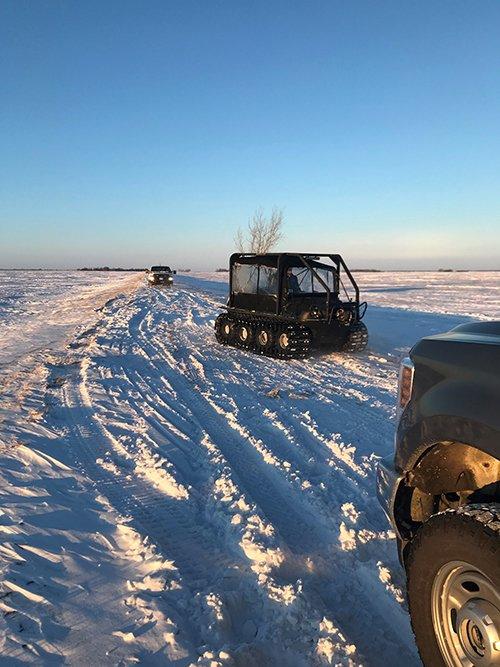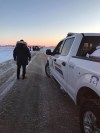How a trek from Canada to the U.S. left four people — including a baby — dead in the Manitoba cold
Advertisement
Read this article for free:
or
Already have an account? Log in here »
To continue reading, please subscribe:
Monthly Digital Subscription
$0 for the first 4 weeks*
- Enjoy unlimited reading on winnipegfreepress.com
- Read the E-Edition, our digital replica newspaper
- Access News Break, our award-winning app
- Play interactive puzzles
*No charge for 4 weeks then price increases to the regular rate of $19.00 plus GST every four weeks. Offer available to new and qualified returning subscribers only. Cancel any time.
Monthly Digital Subscription
$4.75/week*
- Enjoy unlimited reading on winnipegfreepress.com
- Read the E-Edition, our digital replica newspaper
- Access News Break, our award-winning app
- Play interactive puzzles
*Billed as $19 plus GST every four weeks. Cancel any time.
To continue reading, please subscribe:
Add Free Press access to your Brandon Sun subscription for only an additional
$1 for the first 4 weeks*
*Your next subscription payment will increase by $1.00 and you will be charged $16.99 plus GST for four weeks. After four weeks, your payment will increase to $23.99 plus GST every four weeks.
Read unlimited articles for free today:
or
Already have an account? Log in here »
Hey there, time traveller!
This article was published 20/01/2022 (1418 days ago), so information in it may no longer be current.
A Florida man has been charged with human-smuggling as authorities investigate the deaths of four people, including a baby, who were found some 12 metres away from the Canada-U.S. border in Manitoba.
The discovery of the bodies marked a tragic ending to a case of irregular immigration that officials, it was revealed Thursday, believe is part of a larger human-smuggling operation from Canada to the U.S. — in a part of the continent more accustomed to migrants travelling the other way.
The events began with a group of at least nine Indian nationals, all speaking Gujarati, being dropped off near Emerson, Man., on Tuesday night during a blizzard, according to court documents.

By the next day, seven had been taken into custody south of the border, along with the American allegedly meant to pick them up on the U.S. side, while four had died, apparently from exposure to the cold, on the Canadian side of the border.
U.S. authorities said border patrol officials stopped a 15-passenger rental van Wednesday driven by Steve Shand with two undocumented Indian nationals inside, less than a mile south of the border in a rural area between Lancaster, Minnesota, and Pembina, North Dakota. Shand and the Indian nationals were arrested.
Officials also intercepted another group of five Indian nationals nearby who were walking in the direction of where the van was located, according to the court documents.
“They appeared to be headed to an unstaffed gas plant located in St. Vincent, Minnesota. The five Indian nationals explained that they had walked across the border expecting to be picked up by someone. The group estimated they had been walking around for over 11 hours,” the U.S. District Attorney’s Office in Minnesota said in a statement Thursday.
A couple of the foreign nationals had sustained serious injuries and were brought to hospital, with one likely requiring partial amputation of a hand from frostbite.
Five were found wearing identical black winter clothing, including winter coats, black gloves, black balaclavas and insulated rubber boots. Shand had matching gloves and a matching balaclava also.
“One of the group members was in possession of a backpack that did not belong to him. He stated he was carrying the backpack for a family of four Indian nationals that had earlier walked with his group but had become separated during the night,” the news release went on. “The backpack contained children’s clothes, a diaper, toys, and some children’s medication.”
U.S. officials said the dead bodies found in Canada were tentatively identified as the family of four that had been separated from the others.
Shand, 47, appeared in court Thursday and was remanded in custody.
RCMP Assistant Commissioner Jane MacLatchy called the incident “an absolute and heartbreaking tragedy.”
“We’re very concerned … that these individuals, including an infant, were left on their own in a blizzard when the weather hovered around -35 C,” she told a news conference that occurred before Shand’s court appearance.
“You’ll also note that I’m using the term victims — and that’s on purpose.”
MacLatchy said police were working on identifying the people who had died, and their nationalities.
Emerson is a small community of about 600 people bordering both North Dakota to the southwest, and Minnesota to the southeast, with the two states separated by the Red River. There is an official border crossing with Pembina North Dakota, but there is no official crossing with the Minnesota side.
Southern Manitoba had been under an extreme weather warning, with winds up to 70 kilometres an hours, according to residents.
An interview with one of the arrested Indian nationals, meanwhile, described in a complaint filed in Minnesota District Court against Shand, shed some light on that person’s apparent plans.
“One of the Indian nationals provided limited information to Border Patrol. He reported that he paid a significant amount of money to enter Canada from India under a fraudulently obtained student visa,” reads an affidavit by John Stanley, a special agent with the U.S. Department of Homeland Security. “He did not intend to study in Canada but rather to illegally enter the United States.”
The affidavit said an investigation into “a larger human smuggling operation of which Shand is suspected of being a part” is ongoing, as well as the investigation into the deaths of the four individuals found in Canada. Border Patrol Agents had suspected recent smuggling events after finding footprints in the snow, and RCMP agents had discovered an abandoned backpack with a price tag in Rupees, Indian currency, around the same time.
Until the pandemic, Canada had seen a surge of asylum seekers entering the country from the U.S. through unguarded border crossings, driven by then U.S. president Donald Trump’s crackdown on undocumented migrants.
Between 2017 and September 2021, there were 59,776 irregular border crossers intercepted by Canadian officials who made a refugee claims in Canada, including 1,429 who came after the pandemic hit in March 2020, when Ottawa banned them from crossing into the country for asylum.
However, experts say it’s rare for irregular migrants to travel the opposite direction trying to sneak into the U.S.
“We’ve seen that with asylum seekers bound for Canada. This is the first time we’re hearing about people who were on their way to the United States. It’s a little hard to fathom why that would be the case,” said Queen’s University immigration law professor Sharry Aiken.
“It doesn’t mean that it doesn’t happen. We do know that there’s a much larger population of undocumented people in the U.S. and that it’s generally easier to survive there as an undocumented person than it is in Canada.”
Someone would have reached the end of the line in Canada in their attempts to seek status here or had family connections south of the border to take the reverse trip, Aiken speculated.
In December 2016, two Ghanaians Seidu Mohammed and Razak Iyal survived the treacherous journey through hip-deep snow and biting cold, crossing from North Dakota to Manitoba via Emerson for asylum in Canada. The former lost most of his fingers after nearly freezing to death.
Robert Beninger, a longtime Emerson resident and elected member of the Local Urban District committee, says residents have become accustomed to interacting with irregular migrants who come up from Minnesota, where the highway ends just south of the Canadian border, with farmer’s fields on either side.
“For a while there, we were refugee centre-plus. They would come and knock on somebody’s door and we would call the RCMP and try to get them somewhere safe,” he said.
Beninger said it is fairly common for people to be “dumped” kilometres away from the border, and that they would be cold by the time they reached Canada.
“They were dropping them too far away,” he said of those past instances. “It’s just terrible.”
According to a report from Reuters, 143 people crossed the border irregularly into Emerson from the U.S. in the first two months of 2017, at a time when refugee agencies reported higher-than-usual rates of migration to Canada because of Trump’s crackdowns.
The Reeve for the municipality of Emerson-Franklin, Dave Carlson, said the tragedy had rattled him and the others he’s spoken to.
“They were found 10 kilometres east of Emerson — that’s a far more remote area. … It’s farm fields,” he said. “There’s no real shelter, not a lot of landmarks and in poor visibility and extreme wind chills a very dangerous place to be.
“(We’re) trying to understand how someone is that desperate to get out of Canada — and to risk it by doing it in extreme weather in a remote area,” Carlson said. “I just hope nobody else tries this, especially in weather that can kill you.”
Alex McKeen is a Vancouver-based reporter for the Star. Follow her on Twitter: @alex_mckeen




